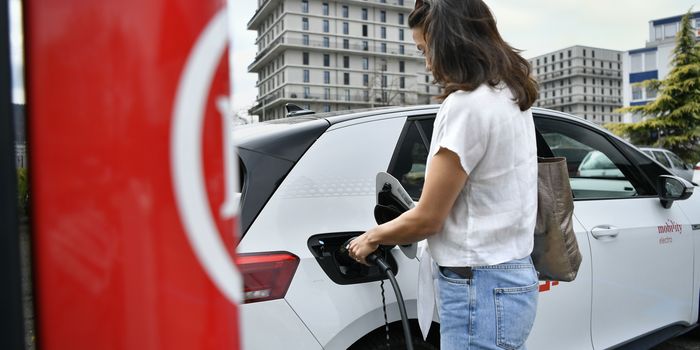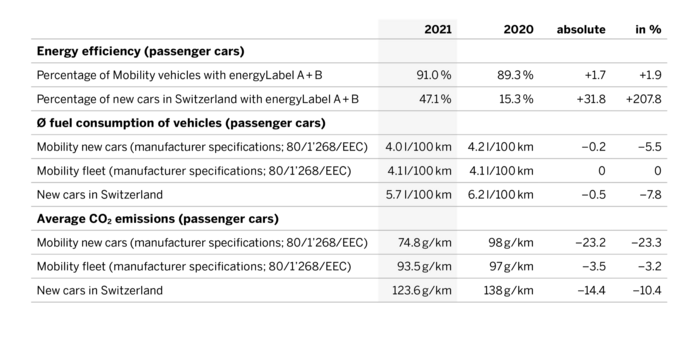Ecological sustainability

Moving towards climate neutrality
The target has been set: Mobility aims to become climate neutral by 2040 – in terms of both how our vehicles are powered and all the emissions we generate. By doing so, the company will be making an important contribution towards protecting the environment and promoting a sustainable way of life. Did you know that one Mobility car already replaces eleven privately owned ones?
The transition to electric is picking up speed
One of the key steps we are taking to pave the way to becoming climate neutral is converting our entire fleet to e-vehicles, which we are aiming to achieve by 2030 at the latest. We are currently laying the foundations for this transition – including planning a nationwide charging infrastructure, which we are implementing with the help of our partners. Mobility is on track and already had 200 electric cars in use at the end of 2021. The same number again are due to be introduced by 2023.
Using strategic partnerships to create a charging station network
Developing a charging network involves overcoming certain technical, organisational and financial challenges. Another issue is that Mobility does not own its parking spaces – it only rents them. Strategic partnerships are therefore crucial to ensuring success. In the year under review, for example, the car sharing provider forged links with Juice Technology, EVTEC and Helion. Together, they are aiming to set up 200 charging stations by 2023. All the owners of the parking spaces have to do is provide access to an electricity supply. Meanwhile, SBB (Swiss Federal Railways) is pulling out all the stops to convert its station parking facilities. Mobility is also holding talks with cities such as Basel, Bern, Zurich and Geneva with a view to guaranteeing customers a consistent charging experience throughout Switzerland.
One fruitful partnership gets under way …
Mobility has set up a close cooperation with the Raiffeisen Group. Over 820 Raiffeisen bank branches now have the option of setting up electric vehicles at their premises for shared transport. They provide the power supply, while Mobility provides the charging station and the vehicle itself. Raiffeisen customers can benefit from discounts on car sharing services too.
… while another one comes to an end
After just under three years, Mobility and Auto Gewerbe Verband Schweiz (AGVS) decided to end their association by mutual agreement with effect from the end of 2021. The idea behind this partnership was to fit vehicles of AGVS partner dealerships with car sharing technology and thus strengthen Mobility’s network. However, in reality it turned out that this could rarely be done efficiently or cost-effectively.
Electric cars proving increasingly popular
Mobility users have no reservations when it comes to electric vehicles. Results of schemes such as the pilot project at Zurich railway station, where ten electric cars have been available for some time now, attest to that. These e-cars are now booked just as often as their fossil fuel-powered counterparts – an encouraging sign indeed! Moreover, surveys show that half of drivers choose to go to this particular location specifically because there are electric cars there – even if it means travelling further. And, incidentally, the range of these vehicles is now more than sufficient for the car sharing community.
Wil: leading the way in the mobility transformation
Wil is the first town in Switzerland where Mobility is operating exclusively with electric cars. Eight e-vehicles are available to customers there. In September 2021, the town also provided all of its residents with a free Mobility annual subscription as part of a sustainability programme. The aim of this is to persuade as many local people as possible to use shared mobility and do something good for the environment in the process.
Important CO2 target reached
On average, Mobility cars generated 93.5 g/km in CO2 emissions as at the end of 2021, which is significantly lower than the average emissions level of new cars in Switzerland (124 g/km). In addition to the growing number of electric vehicles, the systematic conversion of vehicles to hybrid cars in the economy and combi (estate) categories has contributed to this. Mobility’s goal was to reduce the CO2 emissions generated by its own vehicles to less than 95 g/km by 2023. It has now successfully reached this milestone a year earlier than planned.
67’900 people using CO2 offsetting scheme
For the past two years, Mobility customers have had the opportunity to invest 3 centimes per kilometre travelled into myclimate’s “Cause We Care” programme. In the year under review, 67’900 people chose this option when making reservations, thus offsetting 3’473 tonnes of CO2. Well done! Each contribution is matched by Mobility and put towards a climate fund, which is used both to finance climate-related projects in Switzerland and abroad and to expand Mobility’s own zero-
emission electric fleet.
